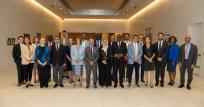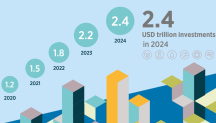

Countries Consolidate Actions to Decarbonise Peacekeeping Operations Ahead of COP28
Newsletter
The transition of the United Nations (UN) peacekeeping operations to renewable energy offers a unique opportunity for the UN and the countries hosting these operations. By powering the operations with renewables instead of fossil fuels, they can simultaneously deliver on climate, development, peace, and security objectives.
To achieve this, Denmark, Norway, the United Arab Emirates, the International Renewable Energy Agency (IRENA), the UN Department of Operational Support (UNDOS), and the UN Department of Peace Operations (UNDPO) presented the Energy Compact on Renewable Energy for Peacekeeping during the High-level Dialogue on Energy in September 2021. The Compact seeks to accelerate the transition of UN peacekeeping operations to renewable energy through public and private partnerships, developing local capacity to supply renewable energy to UN missions, and ultimately, to host communities.
Since its establishment, the stakeholders of this compact met during the Pre-Assembly day of the 13th IRENA Assembly, held earlier this year, to discuss the alignment of climate and development objectives related to the greening of peacekeeping operations and the development priorities of host countries. A formal announcement reaffirming all parties’ commitment to achieving the Compact’s objectives was also made during the Pre-Assembly’s session titled, “High-Level Meeting on the Energy Compact on Renewable Energy for United Nations Peacekeeping”.
At the UN High-Level Political Forum on Sustainable Development in New York on 17 July 2023, the Permanent Mission of the UAE to IRENA, the Permanent Mission of Norway to the United Nations, IRENA, the support countries, host countries and Friends of the Compact have organised a roundtable discussion to profile and mobilise support for the Compact. The roundtable discussion also provided an opportunity for sharing ideas and strategies to effectively implement the Energy Compact.
Prospective projects requiring support were presented during the roundtable. Participants also discussed progress on the actions to be taken under a Joint Communiqué to achieve the aim specified in the Compact.
In the closing remarks, H.E. Dr. Nawal Al Hosany, Permanent Representative of UAE to IRENA said, “Delivering clean energy access to the peacekeeping missions represents a tremendous trifold opportunity: first the Energy Compact helps to deliver on the UN Secretariat’s target of sourcing 80% of its electricity from renewable energy by 2030; second, to enable the host countries to simultaneously deliver on the climate development, peace, and security objectives. And thirdly, it is especially significant in the context of the recently announced vision for COP28 which laid out a practical path to fast track the energy transition, fix climate finance, focus on people, lives, and livelihoods, and insure full inclusivity and climate progress”.

Ms. Lisa Buttenheim, Assistant Secretary-General for Support Operations Department of Operational Support added, “We have practical experience on the deployment of renewable energy. We’ll continue working by strengthening and advancing public-private partnerships, and engaging in a cross-functional dialogue. Our team is very dedicated to the Energy Compact and to its positive legacy. We will continue our collaboration with all partners and look forward to working together within the framework of COP28”.
Moving forward, all in attendance agreed to present future actions of the Compact at COP28 in the UAE, emphasising the human angle of the climate change and the energy transition through the lens of humanitarian relief, reconstruction, and peace on COP 28’s Relief, Recovery and Peace Day.




